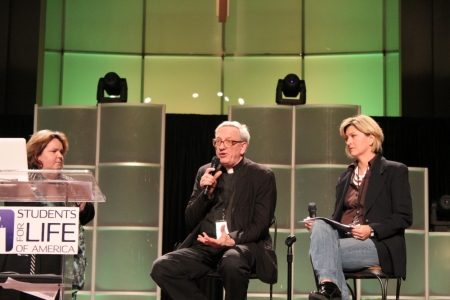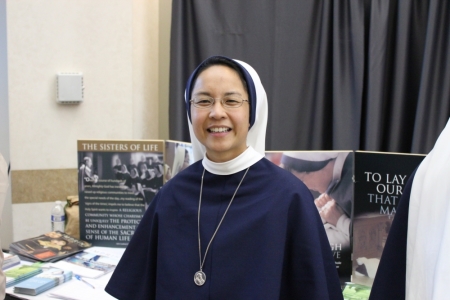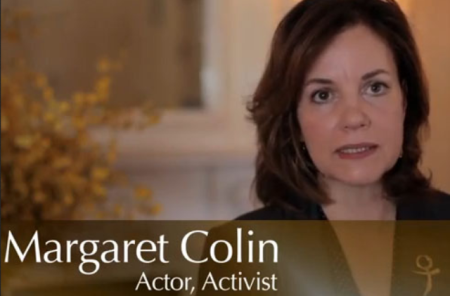Abortion and Social Justice: How Pro-Life Advocates are Meeting the Needs of Women Facing Crisis Pregnancies

UPPER MARLBORO, Maryland — Pro-Life activists argued that loneliness drives women to abortion, so addressing abortion as a social justice issue involves befriending women and helping them during and after a crisis pregnancy. A panel at the 2014 National Students for Life Convention introduced this idea, and two groups at the event prioritized it in their work.
"Abortion is a reflection that we've failed to meet the needs of women", said Cathy Ruse, senior fellow for legal studies at the Family Research Council.
Ruse cited the pro-choice Guttmacher Institute, saying that 92 percent of women who have abortions choose abortion for two overarching reasons – a lack of practical or emotional support. "They need help and they need friends," Ruse suggested. "They don't have them, so they turn to abortion." She challenged the 2,500 pro-life activists at the 2014 National Students for Life Convention to develop "a radical solidarity with women in need."
In discussing the term social justice in a panel at the conference, Ruse explained that "social" has to do with relationship, and "the most basic human need for relationship." She quoted Mother Theresa who said "being unwanted, unloved, and uncared for is a much greater poverty than the person who has nothing to eat."
"Love means being willing to give even when it hurts," explained the moderator, Kathryn Lopez, editor-at-large of National Review Online. She argued that abortion takes away both the mother and the father's chance to learn what love truly is.
Joseph Koterski, associate professor of philosophy at Fordham University, urged the pro-life audience to "go out in evangelization, go out in charity, go out to those really and truly in need, and you will speak values." Only by reaching out in love will their arguments actually convince other people.
Sisters of Life

Antoniana Maria, a member of the religious order Sisters of Life, used scripture to explain her organization's pro-life mission.
"We serve about 800 pregnant women every year," Antoniana Maria shared with CP. She recalled the founding of her order, when John Cardinal O'Connor preached incessantly for the dignity of life, while abortion became worse and worse. "He was led to the scripture passage in Mark 9, where the disciples couldn't cast out a particular demon," she added. Jesus told the disciples that this type of demon requires prayer and fasting.
"The demon of the culture of death, of the contempt of the human person, can only be cast out by prayer and fasting," Antoniana declared. She explained that O'Connor "founded our community primarily to pray and sacrifice – to lay down our lives so that others may live."
Antoniana Maria said her order relies on prayer first – four hours a day – and builds all its work on that. In addition to prayer, they "journey with" women vulnerable to abortion. "The greatest fear of a woman who is in that situation is that she is so alone," the sister said. "Everyone that she thought would rally around her and support her are either telling her to get rid of it or saying 'it's your decision,' which makes her feel even more isolated."
Feminists for Life

Sally Winn, vice president at Feminists for Life of America, told The Christian Post that reclaiming a feminism open to women as women is essential to fighting the alienation of abortion. While "the early American feminists who were pro-life realized that society needed to be changed to accept women," the new pro-choice feminists "had to change us to be more acceptable to society," Winn argued.
Winn asserted that these "second-wave" feminists advocate for abortion because "they try to force us into this male model of success," instead of "being truly pro-woman and helping women who become pregnant." She said they reject a woman's life-giving nature and therefore stigmatize pregnancy.
Feminists for Life, however, embraces women and helps them through a crisis pregnancy, Winn explained. The organization became involved on college campuses because, she said, "we realized that's where there's the highest rate of abortion." She asked a question to prove a point – everyone knows people who are having sex, but how many pregnant women do they know? Feminists for Life aims to make housing, day care, and maternity coverage available to all pregnant women on college campuses.
"I got pregnant my junior year in college," Winn recalled. "If you're pregnant and you're on campus, you see no one else in your situation, so you don't know that you can succeed." She recounted difficulties accessing day care, nursing her daughter, and even sitting in a chair for class – the normal chairs were too small "when you're carrying a human being inside you." Fortunately, Winn had her daughter and finished her education "through a supportive family and friend network," but "not everyone is that lucky."






















